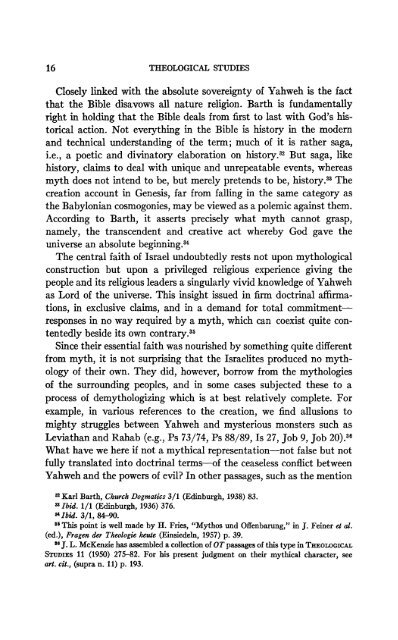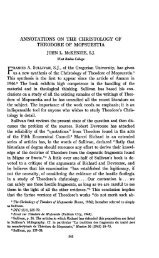SYMBOL, MYTH, AND THE BIBLICAL REVELATION AVERY ...
SYMBOL, MYTH, AND THE BIBLICAL REVELATION AVERY ...
SYMBOL, MYTH, AND THE BIBLICAL REVELATION AVERY ...
Create successful ePaper yourself
Turn your PDF publications into a flip-book with our unique Google optimized e-Paper software.
16 <strong>THE</strong>OLOGICAL STUDIES<br />
Closely linked with the absolute sovereignty of Yahweh is the fact<br />
that the Bible disavows all nature religion. Barth is fundamentally<br />
right in holding that the Bible deals from first to last with God's historical<br />
action. Not everything in the Bible is history in the modern<br />
and technical understanding of the term; much of it is rather saga,<br />
i.e., a poetic and divinatory elaboration on history. 32 But saga, like<br />
history, claims to deal with unique and unrepeatable events, whereas<br />
myth does not intend to be, but merely pretends to be, history. 33 The<br />
creation account in Genesis, far from falling in the same category as<br />
the Babylonian cosmogonies, may be viewed as a polemic against them.<br />
According to Barth, it asserts precisely what myth cannot grasp,<br />
namely, the transcendent and creative act whereby God gave the<br />
universe an absolute beginning. 34<br />
The central faith of Israel undoubtedly rests not upon mythological<br />
construction but upon a privileged religious experience giving the<br />
people and its religious leaders a singularly vivid knowledge of Yahweh<br />
as Lord of the universe. This insight issued in firm doctrinal affirmations,<br />
in exclusive claims, and in a demand for total commitment—<br />
responses in no way required by a myth, which can coexist quite contentedly<br />
beside its own contrary. 35<br />
Since their essential faith was nourished by something quite different<br />
from myth, it is not surprising that the Israelites produced no mythology<br />
of their own. They did, however, borrow from the mythologies<br />
of the surrounding peoples, and in some cases subjected these to a<br />
process of demythologizing which is at best relatively complete. For<br />
example, in various references to the creation, we find allusions to<br />
mighty struggles between Yahweh and mysterious monsters such as<br />
Leviathan and Rahab (e.g., Ps 73/74, Ps 88/89, Is 27, Job 9, Job 20). 36<br />
What have we here if not a mythical representation—not false but not<br />
fully translated into doctrinal terms—of the ceaseless conflict between<br />
Yahweh and the powers of evil? In other passages, such as the mention<br />
32 Karl Barth, Church Dogmatics 3/1 (Edinburgh, 1938) 83.<br />
33 Ibid. 1/1 (Edinburgh, 1936) 376.<br />
34 Ibid. 3/1,84^-90.<br />
36 This point is well made by H. Fries, "Mythos und Offenbarung," in J. Feiner et al.<br />
(ed.), Fragen der Theologie heute (Einsiedeln, 1957) p. 39.<br />
86 J. L. McKenzie has assembled a collection of OT passages of this type in <strong>THE</strong>OLOGICAL<br />
STUDIES 11 (1950) 275-82. For his present judgment on their mythical character, see<br />
art. cit., (supra n. 11) p. 193.
















